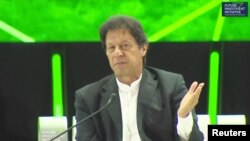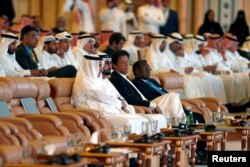Pakistan is mediating between Iran and Saudi Arabia in an effort to end the conflict in Yemen, Prime Minister Imran Khan announced in a televised address Wednesday night.
“We are acting as a conciliator between the two countries to end the war,” he said.
The idea for Pakistan to mediate was first floated by Khan in a previous trip to the kingdom soon after his election as prime minister, according to Fawad Chaudhry, Pakistan’s information minister.
“Since then, Pakistan has been carrying out a Track II process,” Chaudhry said, adding, “we have been in touch with all stakeholders to the conflict.”
The conflict in Yemen started in 2014 when the Houthis, a Shi’ite militia backed by Iran, seized parts of the country, including the capital, from the government in power that was backed by Saudi Arabia. The kingdom formed an alliance with several Arab states and started bombing the Houthis.
Yemen has been at war since then, which has destroyed infrastructure and displaced millions of people. The United Nations recently warned that the country was at risk of a famine that was likely to cause a “massive loss of life.”
U.N. humanitarian chief Mark Lowcock has said that half the country would soon depend on food aid from outside.
Peace negotiations brokered under the United Nations recently broke down. The U.N. envoy for Yemen, Martin Griffiths, has been trying to jump-start the process again.
Looking for Saudi support
Khan, who has recently returned home after attending a three-day investment conference in Saudi Arabia, nicknamed Davos in the Desert, was criticized by some for attending the conference at a time when many in the world stayed away after the controversial disappearance and killing of Saudi journalist and Washington Post contributor Jamal Khashoggi.
But Pakistan is facing a severe economic crisis. With its foreign reserves dwindling and a balance of payment crisis looming, the country was looking to Saudi Arabia for help. The oil-rich kingdom has often bailed out Pakistan in times of financial crisis.
Khan’s visit seemed to have paid off. Saudi Arabia promised to deposit $3 billion in Pakistani banks for one year to shore up its reserves, and provide another $3 billion worth of oil on deferred payment for a year.
“Thank God we’ve got a great package from Saudi Arabia. We thank them,” Khan said.
He also said he was negotiating with two more countries to get similar help in order to reduce the amount of money the country would have to borrow from the IMF.
“When IMF gives you a lot of loans, it puts conditions on you, which hurt the public, increases inflation,” Khan said.
Despite the support, Pakistan will still need a bailout package from IMF that could be up to $8 billion unless the country gets more money from another country. Pakistan has borrowed from the international lending institution 21 times in the last six decades.
Khan is next expected to head to China in early November to seek further financial assistance.





